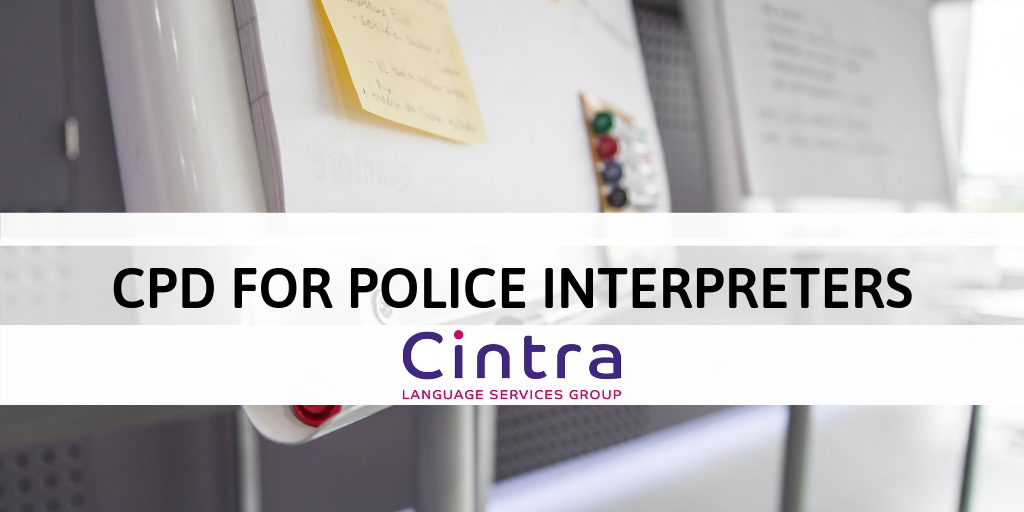Archives for police interpreting services

For a successful and well-prepared interpreter, continuous professional development (CPD) is a must, and here at Cintra we take this very seriously. We make sure that our linguists have regular access to high-quality CPD events that help them become better professionals and ensure they can keep up with the latest hot topics and regulations within their fields.
As Tamás Kovács, our Human Resources Advisor explains: “The importance for linguists to attend our CPD events is mainly to further improve their knowledge and interpreting skills within a specific area. All major interpreting and translation qualifications heavily focus on interpreting and translation techniques and they often miss out vital parts like interpreting environment, personal safety and extra precautions. For example, the Zakon police CPD event in July explained and demonstrated the key rules which are to always safeguard yourself, know the exit routes and never be left alone with the victim or witness.
Apart from the specialised training these CPD events deliver (e.g. mental health, police training, human trafficking), another fantastic opportunity for our interpreters is to network with other linguists, learn the best practices and also, to meet and speak with Cintra staff members. Many linguists join our CPD events because of the great networking opportunities and also, to find out in what ways Cintra can help improve their qualifications and language skills.”
In the past two months we organised two special CPD events, one in Leicester and one in Norwich. The one held in Norwich on 23 November focused on interpreting for the police and advanced interviews. As Tamás said, we had a very similar event in the summer. After our July event, we received so much positive feedback from our interpreters who attended, that we decided to organise another training day on the very same topic with Zakon, so those linguists who missed the first one might also participate.
We held our other CPD day on 18 October in Leicester on transgender awareness with the help and support from Leicestershire Police. The session helped raise the visibility of transgender and gender non-conforming people, increased the linguists’ cultural awareness, knowledge and communication skills, it explained the rights and wrongs and what the Gender Recognition Act says. It mainly focused on the issues for police, custody staff and linguists. The session was led by Jane Chaplin and Penny Ellis from Warwickshire and West Mercia LGBT Independent Advisory Group and Lynne Woodward, Head of Equality and Human Rights at Leicestershire Police.
The linguists who attended these two events gave us very good feedback, saying these CPD days helped “fill gaps in [their] knowledge and refreshed earlier training that had been undertaken in this area.” They found them “very informative and professionally delivered”.
If you are interested in attending one of our future CPD sessions or have any feedback or suggestions, please do not hesitate to get in touch with Tamás via email at hr@cintra.org.uk or by calling 01233 346870.

Part of our mission at Cintra Interpreting is to provide high quality and relevant training and continuous professional development (CPD) opportunities to our linguists, so that they can continuously provide an excellent service to our clients.
Our latest CPD event on 6 July was centred around police interpreting, more specifically advanced interview techniques. We partnered with Zakon Training to organise this informative event and deliver all-day training to our interpreters at the National Space Centre in Leicester.
…read moreCintra is like a machine with many interconnected and intricate pieces that have to align perfectly so that we can provide a great service to our customers. One part of this machine is, of course, our highly experienced and trained interpreters who are out there in the world, helping you communicate and make sure you can get your message across. However, out of public view there is a whole team of busy Bookings Coordinators who make sure that the right interpreters get to you at the right time, and help that Cintra machine stay well-oiled and run smoothly.
Today we’ve caught up with Bookings Team Manager Ursula Fairhurst to ask her about what her team do and how they can help you. …read more
 It was years ago when an old colleague asked me what I planned for my future. Surprised by his question and knowing that he was passionate about computers I said I liked the English language. He laughed saying, “I could make a future for myself with my computer – what future could you make with your English?” That was more than 20 years ago, back in my native country.
It was years ago when an old colleague asked me what I planned for my future. Surprised by his question and knowing that he was passionate about computers I said I liked the English language. He laughed saying, “I could make a future for myself with my computer – what future could you make with your English?” That was more than 20 years ago, back in my native country.
I eventually made the decision to live in the UK and have been settled here for the past 13 years. During that time I have made a lot of English friends who visited my country for my wedding, where I acted as their interpreter. I felt important; I was their communication bridge.
It was then I realized that being fluent in English was not enough. It was difficult to process quickly in my head the English language into my native language and vice versa. Although I thought I had “good English”, that seemed not to be sufficient. I had a passion for the language and I had to find a way to improve my abilities. …read more
We are happy to announce our next Diploma in Police Interpreting course in Warwick!

Are you bilingual, have excellent communication skills and have been thinking of becoming a police interpreter? If you’ve been dreaming of becoming an interpreter in the criminal justice system, now is the time to make those dreams come true, with Cintra’s Diploma in Police Interpreting preparatory course. …read more

Cintra is absolutely delighted to announce that following the recent procurement process, it has once again been chosen as a provider of face-to-face interpreting services for the INTRAN partnership, covering a large number of public sector and voluntary organisations in Norfolk, Suffolk, Cambridgeshire, Hertfordshire, Bedfordshire and Essex. This continues a working relationship which has already lasted since 2001, and which will allow Cintra to continue to serve many existing and new customers via the INTRAN Framework.
Cintra’s Chief Executive, Jerry Froggett, commented: “Having served so many public sector organisations so loyally for many years, it is especially pleasing that this will continue under the new INTRAN Framework, and we very much look forward to the future of this very long-standing relationship. Our loyal regular clients accessing Cintra’s services via the INTRAN Framework can continue to do so as they have always done when the new Framework agreement commences on the 1st July 2017.”
This news adds to an already exciting recent phase in Cintra’s interpreting business, with new contract wins for police forces (together with the renewal of existing contracts) as well as a partnership to enable Cintra interpreters to serve courts in the East of England leaving the company well placed to grow its overall interpreting operations during the remainder of 2017. Now holding positions on a range of national interpreting framework agreements, Cintra is fully accessible to the UK public sector. For further information about how Cintra can assist your organisation with its language service requirements, please contact Ben Ablett, Cintra’s Head of Sales & Marketing, by telephone, 01223 346675, or email, ben.ablett@cintra.org.uk.
 Hi, I’m Serap and I am DPSI LAW qualified Turkish interpreter. I live in the UK and work regularly for Cintra, interpreting and translating Turkish to English and vice versa. I like and enjoy my job – let me give you an idea of a typical day in my working life.
Hi, I’m Serap and I am DPSI LAW qualified Turkish interpreter. I live in the UK and work regularly for Cintra, interpreting and translating Turkish to English and vice versa. I like and enjoy my job – let me give you an idea of a typical day in my working life.
My busiest working day is usually a Sunday, and this weekend was no exception. I’m a qualified police interpreter and also work for healthcare trusts, so although we were going out for Sunday lunch with family, I’m always prepared to go to a police station or hospital at short notice. We take two cars, so my husband doesn’t get stranded. And I keep an overnight bag in the boot. Once, after interpreting for the police over four days and nights, a court usher asked me why I wasn’t wearing a suit. Now I take clothes for interpreting in any situation – police stations, courts, hospital waiting rooms and wards, people’s homes and sadly, even mortuaries.
This Sunday the call from Cintra – a police job – came while we were still at home, so it was easy to for us to go into the routine that gets me on my way as quickly as possible. Cintra works with forces across the East of England and the Midlands, so while my husband made me coffee and a sandwich for the journey, I found the police station on my sat nav. My average ‘commute’ time is 2.5 hours, and I keep in touch with Cintra by Bluetooth, so if I’m delayed the Cintra manager will let the client know. That lets me focus on the job, and I like it that Cintra know all their interpreters by name. To some agencies interpreters are just a number – and I’m not so keen on that!
Once I get to the police station I find out if I’m interpreting for a suspect, a witness or perhaps the victim of a crime. The work is highly confidential, so, sorry, I won’t be telling any true crime stories about this weekend’s particular case! The commonest are drink driving and sexual assault, but I have interpreted in a double murder investigation, and that was quite chilling, believe me.
It’s the interpreter’s job to translate everything the Turkish and English speakers say when we’re in an interview room. Even if a suspect or witness says in Turkish: ‘Don’t translate this.’ Or if the police officers talk about the weather, I translate the chit chat: everyone needs to know what’s going on, just as if the interview was all in English.
And I have to translate exactly what is said. Sometimes, because of the different ways our languages work, or even because of the educational level of the speaker, the words we translate sometimes don’t make much sense to the hearer. For example, Turkish has no pronouns equivalent to he and she: we just use it. So a suspect or a witness might tell me in Turkish: ‘It was talking to me and then it ran up and punched me.’
If I was translating this into English in a social situation, I could make assumptions about the two different people the speaker is referring to. But in a police interview, the interpreter can’t make assumptions. I have to say: ‘He or she was talking to me and another he or she punched me.’ When the police officers look at me like I’m crazy, I suggest they ask me to ask the Turkish speaker to explain for themselves in more detail.
We got through this weekend’s interview quite quickly, and although I missed Sunday lunch, I did get home in time to put my daughter to bed and check with the child minder for after school tomorrow. I’ve been booked to interpret for a health visitor who’s weighing a two-week-old baby. I saw the mum when she was pregnant, so it will be nice to see the new-born – and find out if it’s a he or a she: I’m pretty certain this one won’t be an it!
 To work with us here at Cintra, all interpreters and translators must be trained and qualified as Serap is to the required professional standards. Our linguists are assessed and security-vetted as part of the registration process, and are required to follow our Code of Conduct which stresses confidentiality and impartiality.
To work with us here at Cintra, all interpreters and translators must be trained and qualified as Serap is to the required professional standards. Our linguists are assessed and security-vetted as part of the registration process, and are required to follow our Code of Conduct which stresses confidentiality and impartiality.
Cintra is one of the few agencies with its own in-house interpreter training and Diploma in Public Services in Interpreting exam centre. Through our specially devised courses, foreign language speakers who are new to interpreting can be trained and assessed and start working, before obtaining further qualifications, including the Diploma in Public Service Interpreting.
 I spent 22 hours in police custody last week. So did my wife.
I spent 22 hours in police custody last week. So did my wife.
Don’t worry, we’re both qualified police interpreters, so it’s quite normal for the police to invite us down to the station for a few words. We don’t normally work together, but they needed both of us for this job; seven people held in custody on suspicion of false imprisonment. Though we knew what the term on the charge sheet meant, we did some research and found the legal definition of false imprisonment. We translated it and discussed it. We had all evening to prepare in our mother tongue for the sorts of issues and legal terms we’d need to translate quickly and accurately the next day.Watch movie online The Transporter Refueled (2015)
We got to the police station at 9am. The sergeant said: ‘I hope you’re ready to spend the next 12 hours with us, it’s going to be a long one’. He was more than right. Police interpreters are used to working anti-social hours and long hours don’t scare me. It’s a good way to challenge your brain.
We’d known that it was never going to be a straightforward job, and unusually, we’d even had time to prepare. Then, just as I was interpreting the ‘rights’ for the first suspect, he was further arrested for rape. My job just got even more challenging. More circuits in my brain lit up. I remembered back to the Diploma of Police Interpreting course I took with Cintra. We had a lovely lady trainer – a police retired officer – who shared with us some of her experiences getting to know the victims of sex crimes – and the criminal perpetrators. She introduced us to words that didn’t need definitions.
Back to the sergeant: he asked me to help interpret for the doctor so he could take intimate samples from the alleged male offenders. Well, the interpreter’s job is to explain what’s going on, and the sergeant was happy I was a male.
The solicitors started arriving, so things got rolling. Each consultation was one and a half hours long. Then solicitors had to be changed as they discovered conflicts. Before I realised, six hours had gone past. Back in the waiting room on a short break, I could hear my stomach rumbling, but it wasn’t the right time for lunch. A couple of new solicitors arrived. We had to get things going. You can eat later, I told myself.
Two hours later another interpreter arrived. That was my lucky break – I snuck out for a juicy McDonalds. And I managed to get some chicken for my wife. It was hard to find each other between interviews and consultations. She didn’t really enjoy that meal, bless her.
Half an hour’s break and that BigMac recharged my batteries. Back at the interviews the detectives were meticulous. They were all ears as I interpreted their blunt questions and the suspect’s answers. All this while my wife and the other interpreters were in adjacent interview rooms. Like me, they were listening intently and choosing their words carefully. It went on and on, and then it was time for the very last interview.
You could say I was the last man standing, so lucky me, I got to interpret for the last interview. It was 1 o’clock in the morning when we entered the interview room. The solicitor had to put a lot of questions. One and a half hours later: conflict! With that last solicitor gone, the police had run out of legals to call on.
After two hours of phone calls, looking in vain for solicitors, the police officers finally reached a solution. They could get a legal representative at another police station, so we bundled into cars and managed a quick transfer. Well, even at 3 o’clock in the morning, it was a 50-minute drive. Good thing it took me closer to home. And now my wife had finished her shift, at least she was able to turn up the expensive ‘central heating’ and sleep in the car.
I realised I was at that stage, past sleep, where I could go on and on. Just as well, because this final interview was very long and the questions from the detectives seemed like they would peel the skin off this man they had arrested on suspicion of rape.
Finally finished at 7am. I was not so much relieved as frustrated when I left the police station – 22 hours after walking in.
That’s it. That’s the end of my story. I can’t tell you why it was frustrating, or give you more details. I’m a police interpreter and the work I do is highly confidential.
Our interpreter blogger, Cristian, is originally from Romania and is a qualified interpreter with a Diploma in Police Interpreting.
Photo credit: Geoffrey Lebrec/freeimages.com


